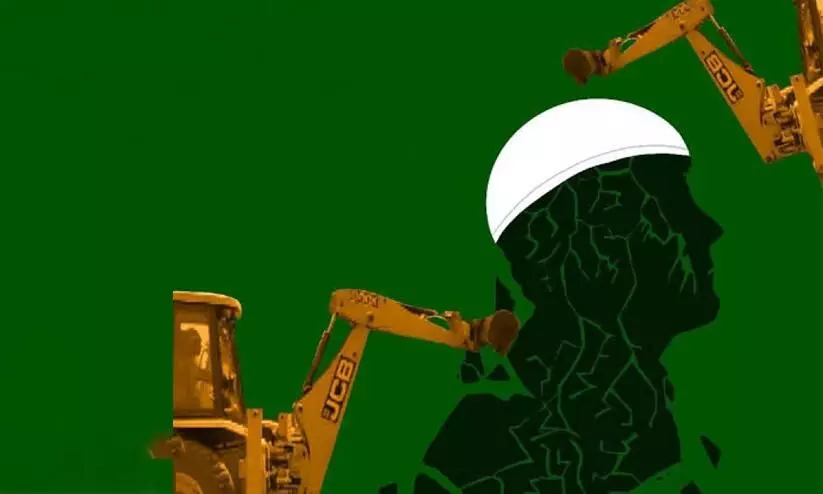
Bulldozing of Muslim properties with connivance of Hindu officials
text_fieldsRecent events in Madhya Pradesh have raised serious concerns about the treatment of Muslim communities by local authorities and police, sparking outrage and calls for an impartial investigation. Reports indicate that administrative actions, including the demolition of properties belonging to Muslims, have been executed under dubious circumstances, raising questions about legality and accountability.
In the wake of increased incidents of Muslim community members and leaders being targeted in states where the BJP rules, there is a call for an impartial investigation into the allegations and charges being brought against those whose houses and properties were bulldozed without prior notice, often citing false charges.
Recent events in Madhya Pradesh have raised serious concerns about the treatment of Muslim communities by local authorities and police, sparking outrage and calls for an impartial investigation. Reports indicate that administrative actions, including the demolition of properties belonging to Muslims, have been executed under dubious circumstances, raising questions about legality and accountability.
In Chhatarpur, the house of local Congress leader Shahzad Ali was reportedly razed to the ground following a protest by Muslims against perceived public insults to Prophet Muhammad. Witnesses suggest that Ali was attempting to mediate during the protests when clashes erupted between demonstrators and police, leading to allegations of stone pelting.
However, authorities quickly implicated Ali in inciting violence and responded with demolition actions against his property, along with the destruction of his vehicles. This incident has been interpreted by many as a form of collective punishment against the Muslim community.
Authorities justified these demolitions by claiming the properties were illegally constructed, yet inconsistencies in their explanations have emerged. Initially, officials stated that the house was built on government land, later asserting it was near a water body, and finally suggesting that the construction plans had not been approved. Critics question whether it is standard practice to demolish an entire house for such reasons, particularly without providing adequate notice or a fair hearing.
Moreover, reports have surfaced of a police procession that forced participants to chant slogans that belittled their identity. Such actions have led many to believe that systemic discrimination against Muslims is at play, fostering an atmosphere of fear and humiliation.
Compounding these issues, there have been alarming allegations concerning police actions in Assam, where an accused rapist reportedly died under suspicious circumstances while in police custody.
Eyewitnesses and journalists raised questions about the narrative presented by authorities, as reports suggested that the accused drowned in a pond while attempting to escape. Such incidents have led to a growing perception that law enforcement agencies are operating with impunity, particularly against minority communities.
Further complicating the situation, historical patterns of targeting Muslims during incidents of communal violence have come to light. Instances have been documented where the properties of Muslim individuals are demolished following allegations of wrongdoing, while similar actions against Hindu individuals are notably absent.
For example, in Ujjain, the house of a Muslim accused of rape was demolished, while the Hindu co-accused was not subjected to the same fate. These discrepancies highlight a troubling trend in the application of justice based on communal identity.
Adding to the concerns, comments made by officials, including a District Magistrate in Bhind, have reportedly indicated a bias against Muslims. Such remarks suggest an alarming willingness among some officials to act on communal lines, raising fears of a politicised administration targeting minority communities.
This pattern of behaviour appears to reflect a broader strategy aimed at intimidating and marginalising Muslims, which has alarmed civil society groups and opposition parties.
The broader political context reveals a concerning trend of Hindutva ideologies permeating state institutions, where actions that were once attributed to fringe groups are now being mirrored by the police and administration. This shift has been described as the "Hindutvafication" of state machinery, prompting fears that the fundamental rights of individuals are being compromised in the name of maintaining law and order.
Despite these serious allegations, opposition parties, including Congress, have been criticised for their muted responses. While some leaders have condemned unconstitutional actions taken against minority communities, there remains a lack of sustained pressure on those in power to ensure accountability and protect the rights of all citizens.
Observers urge opposition leaders to take a firm stand against the violence perpetrated by administrative bodies and to advocate for a more equitable application of justice.
This is based on an opinion article written by Apoorvanand in The Wire.






















